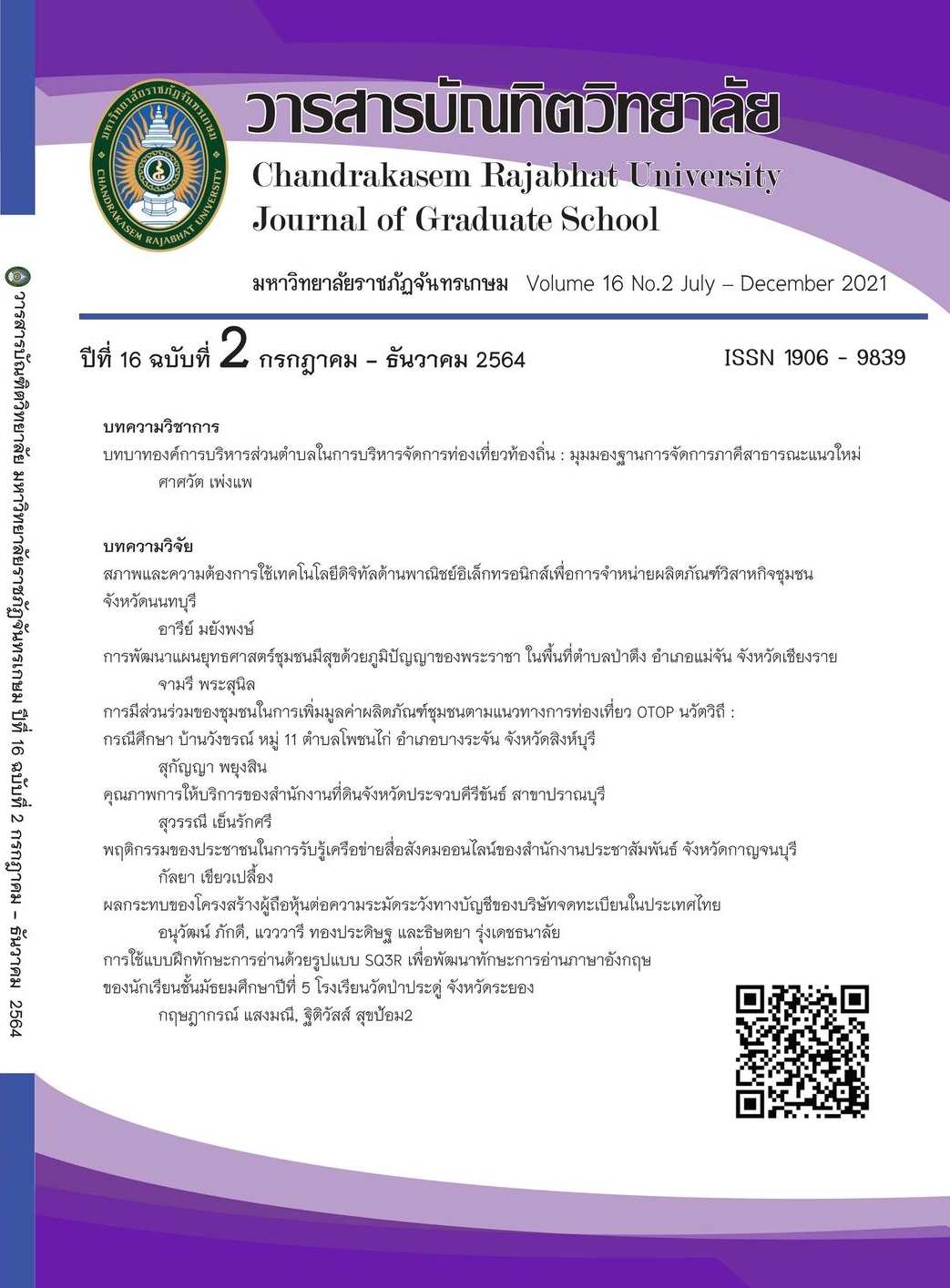ผลกระทบของโครงสร้างผู้ถือหุ้นต่อความระมัดระวังทางบัญชีของ บริษัทจดทะเบียนในประเทศไทย
Main Article Content
บทคัดย่อ
การวิจัยครั้งนี้มีวัตถุประสงค์เพื่อทดสอบผลกระทบของโครงสร้างการถือหุ้นต่อความระมัดระวังทางบัญชีของบริษัทในประเทศไทย โดยใช้ข้อมูลตัวอย่างจากบริษัทที่จดทะเบียนในตลาดหลักทรัพย์ในปี พ.ศ. 2559-2560 คิดเป็น 802 ตัวอย่าง เก็บรวบรวมข้อมูลจากแหล่งข้อมูลทุติยภูมิ ได้แก่ งบการเงินประจำปี และรายงานประจำปี ซึ่งวิเคราะห์ข้อมูลโดยใช้เทคนิคการวิเคราะห์ความถดถอยพหุคูณ สำหรับตัวแปรอิสระที่ใช้ในการวิจัยครั้งนี้มี 4 ตัวแปร ประกอบด้วย การถือหุ้นโดยสถาบัน การถือหุ้นโดยนักลงทุนต่างชาติ การถือหุ้นโดยรัฐบาล และการกระจุกตัวของผู้ถือหุ้น
ผลการวิจัยพบว่า การถือหุ้นโดยรัฐบาล และการกระจุกตัวของผู้ถือหุ้นส่งผลกระทบเชิงบวกอย่างมีนัยสำคัญกับความระมัดระวังทางบัญชี นอกจากนั้นยังพบว่าตัวแปรควบคุม คือ อัตราส่วนหนี้สินส่งผลกระทบเชิงบวกอย่างมีนัยสำคัญกับความระมัดระวังทางบัญชี ในทางตรงกันข้ามพบว่าอัตราการเติบโตของกิจการ ขนาดกิจการ และความสามารถในการทำกำไรส่งผลกระทบเชิงลบอย่างมีนัยสำคัญกับความระมัดระวังทางบัญชี
Article Details

อนุญาตภายใต้เงื่อนไข Creative Commons Attribution-NonCommercial-NoDerivatives 4.0 International License.
เอกสารอ้างอิง
กรัณฑรัตน์ บุญญวัฒน์. (2554). โครงสร้างผู้ถือหุ้นและคุณภาพของรายงานทางการเงิน. วารสารนักบริหาร, 31(2), 152-158.
นิพัฒน์ โพธิ์วิจิตร, พิรุณา ไบโลวัส และฐิติมา สิทธิพงษ์พานิช. (2555). ผลกระทบของโครงสร้างผู้ถือหุ้นที่มีต่อการบริหาร
กำไรของบริษัทจดทะเบียนในตลาดหลักทรัพย์แห่งประเทศไทย. วารสารวิชาชีพบัญชี, 8(21), 20-40
ตลาดหลักทรัพย์แห่งประเทศไทย. (วันที่ 20 ธันวาคม 2560). หลักการกำกับดูแลกิจการที่ดีสำหรับบริษัทจดทะเบียน ป
สืบค้นจาก http://www.set.or.th.
พิรุณา พลศิริ. (2552). การกำกับดูแลเพื่อสร้างมูลค่ากิจการ. กรุงเทพฯ: อมรินทร์พริ้นติ้งแอนด์ พลับลิชชิ่ง.
Affes, H., & Sardouk, H. (2016). Accounting Conservatism and the Company's Performance: the Moderating Effect of the
Ownership Structure. Journal of Business & Financial Affairs, 5(2), 1-8.
AL-Sraheen, D. O. (2014). The influence of corporate ownership structure and board members’ skills on the accounting
conservatism: Evidence from non-financial listed firms in Amman stock exchange. International Journal of Accounting and
Financial Reporting, 4(1), 177-200.
Amneh Alkurdi, Munther Al-Nimer and Mohammad Dabaghia. (2017). Accounting Conservatism and Ownership Structure
Effect: Evidence from Industrial and Financial Jordanian Listed Companies. International Journal of Economics and Financial,
(2), 608-619.
An, Y. (2015). Dose foreign ownership increase financial performance quality?. Asian Academy of Management Journal, 20(2),
-101.
Apadore, K., & Mohd-Noor, N. (2013). Determinants of audit report lag and corporate governance in Malaysia. International
Journal of Business and Management, 8(15), 1833-8119.
Astami, E., & Tower, G. (2006). Accounting policy choice and firm characteristics in the Asia Pacific region: An international
empirical test of costly contracting theory. International Journal of Accounting, 41(1), 1-21.
Ball, R. and Shivakumar, L. (2005). Earnings quality in UK private firms: comparative loss recognition timeliness. Journal of
Accounting and Economics, 39(1), 83-128.
Baloria, V. (2014). Politicians’ Equity Holdings and Accounting Conservatism. Working Paper.
Balsam, S., Krishnan, J. & Yang, J. S. (2003). Auditor industry specialization and earnings quality. Auditing: A Journal of Practice
and Theory, 22, 71-97.
Bao, S. R., & Lewellynb, K. B. (2016). Ownership structure and earnings management in emerging markets-An
institutionalized agency perspective. International Business Review, 26(5), 828-838
Burns, N.. & Grove, S. K. (1993). The practice of nursing research: Conduct, critique and utilization (2nd ed). Philadelphia:
Saunders.
Bushman, R., & Piotroski, J. (2006). Financial reporting incentives for conservative accounting: The innocence of legal and
political institutions. Journal of Accounting and Economics, 42(1-2), 107-148.
Chen, H. J., Chen, G. L., & Wang, Y. (2010). Effects of borrower and lender state ownership on accounting conservatism.
Journal of Accounting Research, 48(5), 973-1014.
Cheng, S. Q. (2006). An Empirical Study on the Institutional Investors and Accounting Earnings Information of the listing
Corporation. The Management of the World, 9, 129-136.
Choi, H., Sul, W., & Cho, Y. (2011). Board structure, minority shareholders protection, and foreign block ownership. The Journal of Professional Management, 14(2), 1-26.
Dou, Y., Ole-Kristian, H., Thomas, W., & Zou, Y. (2013). Blockholder Heterogeneity and Financial Reproting Qauality. Working Paper.
Durnev, A., & Fauver, L. (2008). Stealing from Thieves: Firm Governance and Performance When States are Predatory, Working Paper, McGill University.
Fan, Po-Hung & Wong, T.J.. (2002). Corporate Ownership Structure and the Informativeness of Accounting Earnings in East Asia. Journal of Accounting and Economics. 33, 401-425. 10.1016/S0165-4101(02)00047-2.
Feldmann, D. A. & Schwarzkopf, D.L. (2003). The Effect of Institutional Ownership on Board and Audit Committee Composition. Review of Accounting and Finance, 2(4), 87-109.
Gedajlovic, E. and Shapiro, D. M. (2002). Ownership structure and firm profitability in Japan. Academy of Management Journal, 45(3), 565-575.
Gillan, S. L., & Starks, L. T. (2003). Corporate governance, corporate ownership, and the role of institutional investors: A global prespective. Journal of Applied Finance, 13, 4-22.
Givoly, D., and C. Hayn. (2000). The changing time-series properties of earnings, cash flows and accruals: Has financial reporting become more conservative?. Journal of Accounting and Economics, 29(3), 287-320.
Holderness, C. (2003). A Survey of Blockholders and Corporate Control. Economic Policy Review, 9(1), 51-64.
Jiang, L., & Kim, J. B. (2000). Cross-corporate ownership, information asymmetry and the usefulness of accounting performance measures in Japan. The International Journal of Accounting, 35, 85-98.
Kho, B. C., Stulz, R. M., & Warnock, F. E. (2009). Financial globalization, governance, and the evolution of the home bias. Journal of Accounting Research, 47(2), 597-635.
Kiatapiwat, W. (2010). Controlling Shareholders, Audit Committee Effectiveness, and Earnings Quality: The Case of Thailand. (Doctoral Dissertation).
Le, T. V., & Buck, T. (2011). State ownership and listed firm performance: A universally negative governance relationship?. Journal of Management and Governance, 15(2), 227-248.
Lin, F. Y., Wu, C.M., Fang, T. Y., & Wun, J. C. (2014). The Relations among Accounting Conservatism, Institutional Investors and Earnings Manipulation. Economic Modelling, 37: 164-174.
Mohammed, N. F., Ahmed, K., & ji, X. D. (2011). Accounting conservatism, corporate governance and political influence. Australia: School of Accounting, La Trobe University.
O'Brien, R. (2007). A caution regarding rules of thumb for variance inflation factors. Quality & Quantity, 41, 673-690.
Obaid, I. (2010). The role of institutional investment in increasing the degree of accounting reservatism. Journal of King Saud University Administrative Sciences, 20, 1-38.
Ramalingegowda, S., & Yu, Y. (2012). Institutional ownership and conservatism. Journal of Accounting and Economics, 53(1), 98-114.
Rouf, A., & Al-Harun, A. (2011). Ownership structure and voluntary disclosure in annual reports of Bangladesh. Review of Economic and Business Studies, 4(1), 239-251.
Schipper, K. (1989). Commentary on Earnings Management. Accounting Horizons, 3(3), 91–102.
Selahudin, N. F., & Nawang, D. (2015). The impact of government ownership on practices in Malaysian public listed companies. Journal of Education and Social Sciences, 2, 115-120.
Shuto, A., & Takada, O. (2010). Managerial ownership and accounting conservatism in Japan: A test of management entrenchment effect. Journal of Business Finance and Accounting, 37(7-8), 815-841.
Song, F. (2015). Ownership structure and accounting conservatism: A literature review. Modern Economy, 6(4), 478-483.
Wen, Z. L. (2010). An Empirical Study on the Impact of Institutional Investors Holding on the Accounting Conservatism. Enterprise Economy, 2, 154-157.
Zhu, C.F., & Li, Z.W. (2008), Study of state controlling effect on accounting conservatism. Accounting Research, 5, 38-45.


